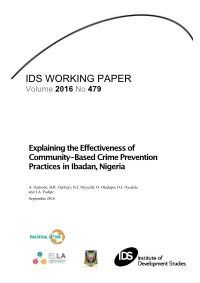Explaining the Effectiveness of Community-Based Crime Prevention Practices in Ibadan, Nigeria
By A. Ojebode; B.R. Ojebuyi; N.J. Onyechi; O. Oladapo; O.J. Oyedele and I.A. Fadipe .
The problem of ineffective policing still persists in post-colonial Africa and as a result, both donors and governments are seeking non-state alternatives or complements to the state apparatuses. These alternatives include private sector provision, donor-driven interventions and community-based or community-driven crime prevention practices. There is no shortage of community-based crime prevention (CBCP) practices in Africa and they come in a variety of forms and models: neighbourhood watches, vigilantes, religious and ethnic militias, and neighbourhood guards. However, the effectiveness of CBCP practices is still a subject of controversy despite the widespread prevalence of these practices. This study looks at the effectiveness of CBCP practices, considers possible reasons for their effectiveness or ineffectiveness, and on the basis of the research, makes some policy recommendations.
Brighton, UK: Institute of Development Studies, 2016. 59p.


